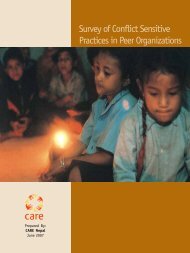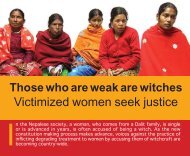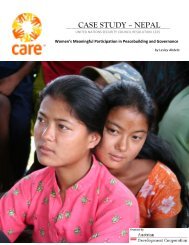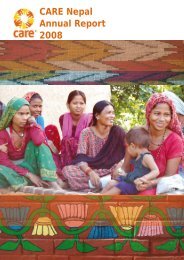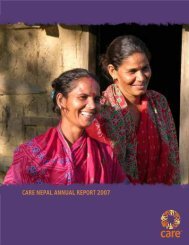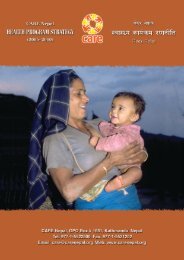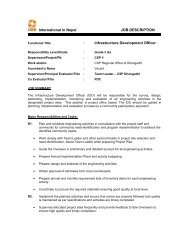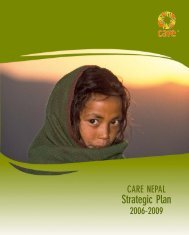Untitled - Care Nepal
Untitled - Care Nepal
Untitled - Care Nepal
You also want an ePaper? Increase the reach of your titles
YUMPU automatically turns print PDFs into web optimized ePapers that Google loves.
The above figure presented the overall<br />
process of coping. Mostly psychosocial<br />
problems occur due to social issues such as<br />
being ignored by family members,<br />
separation from family members and being<br />
physically disabled. Both positive and<br />
harmful ideas were explored as well as<br />
community support and difficulties during<br />
coping with problems were identified. It<br />
was found that most of the women firstly<br />
thought of suicide (they have a feelings that the life<br />
is worthless after the incident). Secondly, thought<br />
about their family members while suffering<br />
from the problems; then they realized that<br />
these things could happen to any body and<br />
then started to share with close friends. Some<br />
of them said they shared the problems with<br />
their family members especially with sons<br />
and daughters. Some of them used alcohol<br />
to overcome the problem. Women who had<br />
suffered from their in-laws and husband<br />
found support from their maitis (parental<br />
relatives) economically. Furthermore, women<br />
Table 5: Individual coping ideas<br />
were supported by their own children.<br />
Children helped their mothers to do<br />
household work and spent more time than<br />
before. On the other hand some of them were<br />
beaten and suspected of having relationships<br />
with other men which was really the obstacle<br />
for women to cope with psychosocial<br />
problems.<br />
According to the Janajati women in all four<br />
districts they were not forced to work<br />
unwillingly. It was mentioned that men as<br />
well performed as women at home. At the<br />
same time Janajati women expressed that<br />
there was no restriction for women to work<br />
in the place of men. One of the janajati<br />
women said in Chitwan,<br />
“We can do things in places of men if needed.<br />
It means men are scolded and beaten by<br />
women if they perform any mistake”.<br />
(Everyone supported this argument and<br />
some were laughing as well).<br />
SN<br />
COPING METHODS<br />
CHT<br />
(15)<br />
MAK<br />
(14)<br />
MOH<br />
(12)<br />
SAR<br />
(13)<br />
TOTAL<br />
(54)<br />
%<br />
1<br />
Console themselves by saying they are uneducated/life is<br />
6<br />
4<br />
10<br />
4<br />
24<br />
44.4<br />
just like this<br />
7<br />
9<br />
3<br />
2<br />
21<br />
38.9<br />
2<br />
Share with their close friends/while working in field<br />
3<br />
They do hard work to forget the problem/spend time to<br />
5<br />
8<br />
4<br />
2<br />
19<br />
35.2<br />
make alcohol/going out of house to relatives, market<br />
4<br />
Tolerate by remaining silent/do not want to go out from<br />
5<br />
4<br />
2<br />
11<br />
20.4<br />
home/stay alone<br />
5<br />
Share with family, group/saving group<br />
6<br />
1<br />
2<br />
9<br />
16.7<br />
6<br />
Just bear the pain thinking of the future of their children<br />
1<br />
3<br />
3<br />
7<br />
13.0<br />
7<br />
Weep alone<br />
2<br />
1<br />
1<br />
2<br />
6<br />
11.1<br />
8<br />
Drink alcohol and get relief<br />
3<br />
2<br />
5<br />
9.3<br />
9<br />
Fight for the rights/confidence build up<br />
2<br />
1<br />
1<br />
4<br />
7.4<br />
10<br />
Try to sleep to forget the problems<br />
2<br />
1<br />
3<br />
5.6<br />
Sources: Free-listing with 54 women<br />
Psychosocial Issues of<br />
Women affected by conflict<br />
25



